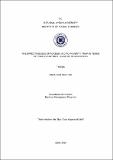DSpace Repository
THE EFFECTIVENESS OF FOREIGN AID TO POVERTY TRAP IN TERMS OF POOR COUNTRIES – CASE OF AFGHANISTAN
JavaScript is disabled for your browser. Some features of this site may not work without it.
| dc.contributor.author | ghazizada, jalil ahmad
|
|
| dc.date.accessioned | 2021-04-14T10:34:35Z | |
| dc.date.available | 2021-04-14T10:34:35Z | |
| dc.date.issued | 2019 | |
| dc.identifier.uri | http://hdl.handle.net/11547/7083 | |
| dc.description.abstract | Foreign aid as external resources, mostly transfer from developed countries to under developing countries with the aim of boosting economic development. Based on economic theories, foreign aid to developing countries has positive impact and causing increment life standards and poverty reduction in these countries. In the other side, some economists criticize foreign assistances through outcome of these aid flows from the poor countries. These critics state that foreign aids by obtaining corruption and bureaucracy have negative effect rather than positive impact in developing countries. The debate on effectiveness of foreign aid is still ongoing while the consequences of the foreign assistances to the poor countries are under question yet. This research investigates on role of foreign aid in poverty alleviation and economic development of Afghanistan, using time series analyses covering a period of nine years (2006 to 20150. The study using secondary data and Households and NPISHs Final consumption expenditure per capita growth (annual %) has chosen as main variable for measuring poverty. Afghanistan is one of the poorest countries in the world. The country has received huge amount of foreign assistance after 2001 which named the country one of the biggest recipient in the world, still suffering from poverty. Overall, the study funds that foreign aid has negative or no significant impacts on country situation rather than reducing poverty. The negative and insignificant results could be defined by increasing corruption, misallocation of the aids, donor driven and lack of ownership of the aids by Afghanistan’s government. Secondly for the analysis of how aid can be made more effective in reducing poverty, empirical evidence suggests that institutional quality, control of corruption and trade openness are vital for aid effectiveness. Economic growth and trade openness have been found to be necessary conditions for poverty reduction. | tr_TR |
| dc.title | THE EFFECTIVENESS OF FOREIGN AID TO POVERTY TRAP IN TERMS OF POOR COUNTRIES – CASE OF AFGHANISTAN | tr_TR |
Files in this item
This item appears in the following Collection(s)
-
Tezler -- Thesis [3470]
